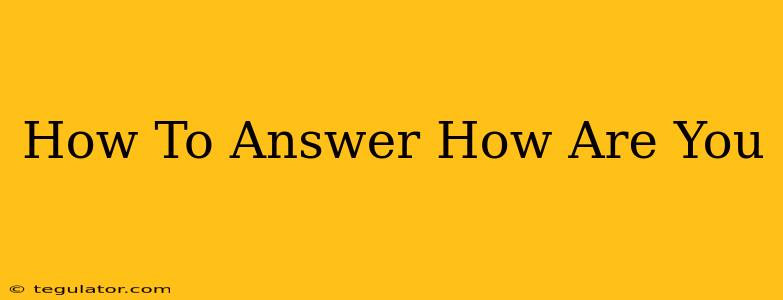The seemingly simple question, "How are you?" often leaves us stumped. While a quick "Fine, thanks" might suffice in passing, there are many ways to answer this common greeting, depending on the context and your relationship with the person asking. This guide will explore various responses, helping you navigate this social minefield with confidence and finesse.
Understanding the Context: It's Not Always a Genuine Inquiry
Before diving into responses, it's crucial to understand that "How are you?" isn't always a sincere request for a detailed life update. Sometimes it's a polite formality, a social lubricant to initiate conversation. Other times, it's a genuine expression of care. Your response should reflect the context.
Scenario 1: Casual Acquaintances or Brief Encounters
For fleeting interactions with colleagues, shopkeepers, or acquaintances, a simple and polite response is perfectly acceptable. Examples include:
- "I'm doing well, thank you." (Classic and reliable)
- "Good, how about you?" (Courteous and keeps the conversation flowing)
- "I'm doing okay." (Slightly more nuanced, allows for further conversation if desired)
- "Pretty good, thanks!" (Energetic and positive)
Avoid overly detailed answers in these situations. Keep it brief and move the conversation along.
Scenario 2: Close Friends and Family
With close friends and family, you have more leeway to be open and honest. You can share more about your day, your feelings, or even your struggles. Here are some options:
- "I'm great! Just finished [activity] and feeling fantastic." (Shares positive details)
- "I'm a bit tired, but otherwise okay. How's your week been?" (Honest and invites reciprocity)
- "Things are pretty hectic right now, but I'm managing. How are you holding up?" (Acknowledges challenges while showing empathy)
- "Actually, I'm feeling a bit down today, but I appreciate you asking." (Open and honest, allows for support if needed – use with caution and only with trusted individuals)
Remember, genuine connection is key. Be authentic in your response and show that you care about the other person as well.
Scenario 3: Professional Settings
In professional environments, maintain a level of professionalism. While you can be friendly, avoid overly personal details.
- "I'm doing well, thank you. Busy but productive." (Professional yet personable)
- "Good morning/afternoon, I'm having a productive day so far." (Formal and appropriate)
- "Everything's going smoothly, thanks for asking." (Concise and positive)
Avoid complaining or dwelling on negative aspects of your work life.
Beyond the Words: Nonverbal Communication
Remember that your nonverbal cues – your tone of voice, facial expression, and body language – are just as important as your words. A genuine smile and positive body language can significantly enhance your response, regardless of the words you use.
Mastering the Art of the "How Are You?" Response
Learning how to answer "How are you?" effectively is a social skill that develops over time. By understanding the context, being authentic, and paying attention to your nonverbal cues, you can navigate this seemingly simple question with grace and confidence. It's more than just a question; it's an opportunity to connect with others and build stronger relationships.

